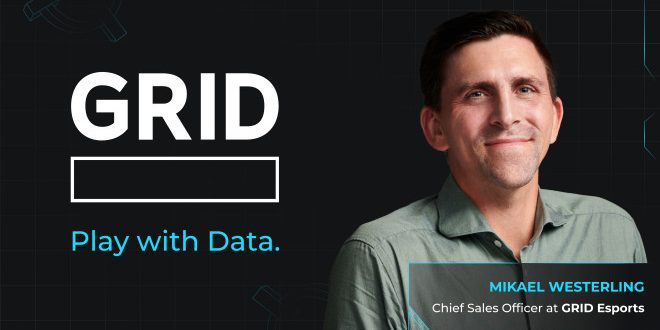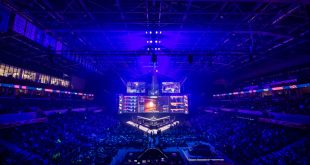Esports has grown into an independent and successful betting vertical over the last few years. With innovative strategies emerging from the industry’s major players, successful tailor-made products from new entrants, and increased regulatory activity in the esports-betting space, esports has a bright present and strong future in the betting space.
However, there’s one major challenge inhibiting esports betting from reaching its full potential – the prevalence of unofficial data and odds sources in the space. For Mikael Westerling, Chief Sales Officer and Co-Founder of GRID, the game data platform, official data is the only way to unlock the next level of esports entertainment.
In a conversation with SBC News, Westerling explains the role and importance of official data within the esports sector, the current regulatory status, and how this can elevate the vertical to become a key component of a betting strategy.
GRID specialises in providing live esports data infrastructure and distribution services for competitive gaming titles, achieved by partnering directly with rights holders like Riot Games or KRAFTON. GRID’s largest commercial data customers include industry leaders such as Pinnacle, BETER, Oddin, Kambi, and bet365. It is at the core of GRID’s mission to accelerate the sustainable growth of betting within the broader esports ecosystem by exclusively handling official data.
“Thanks to our comprehensive data platform infrastructure, we enable the sourcing of official live data assets, directly from the game, and, in the case of betting, we distribute it on behalf of the rights holders to our network of integrated commercial partners,” he began.
For Westerling and GRID, one of the key challenges facing the esports industry is the supply of unofficial data to the market – something that he explained has a direct negative impact upon the quality of betting products available to punters, introduces integrity challenges, and infringes on IP of game developers.
Westerling said: It is important to grasp the critical difference in intellectual property (IP) ownership between traditional sports and esports. There’s no one entity that actually owns football, but there’s one that owns VALORANT – its developer and publisher Riot Games.
“The competitive esports scene is fundamentally reliant on the game IP, which is exclusively owned by the game publisher. Without the game itself, there would be no esports scene. This ownership extends to all aspects of game IP, including live esports data generated within the game. In the context of our discussion, this data is crucial for the success of esports betting products.
“In esports there’s one source of truth – the game server, owned by the rights holder. Official data in esports leaves nothing to be desired – due to the digital nature of the sport it is- the most granular feed, the fastest feed and 100% accurate
“If you use unofficial sources, data will not come from the game server resulting in feeds being delayed, incomplete, and unreliable. It’s impossible to build a sustainable product that can truly attract esports punters relying on an inferior source that can be shut down overnight.”
GRID’s approach to esports data lies very much in unlocking its “potential” to enhance the sustainability of the sector for all stakeholders.
Westerling explained that this ethos is shaped very much by the company’s experience within the esports, data and betting sector, which has helped GRID to understand from the very beginning the pain points that betting operators were facing.
GRID’s Chief Sales Officer continued: “Esports data is not just a commodity to us. We look at esports data as the key to unlocking the next-level entertainment in esports for everyone. We don’t just move it from the source to the consumer, we have created the technological infrastructure for it to thrive, we understand its potential.
“GRID has been founded upon the conviction that the future of esports will be data-driven. A conviction that has been derived from our own expertise at the intersection of esports, data and betting. We know the pain of not having access to official data and our mission has been since day one to democratise this access while maintaining the sustainability of the ecosystem for everyone – the rights holders, the data-powered businesses, and esports fans.”
By using game title agnostic solutions available via the GRID Data Platform, betting operators can access multiple data feeds from different games with only one integration, expanding their esports offering in a scalable fashion, all powered by official data.
“Combining advanced proprietary technology and our business background we act as a partner to all our customers, not just a data provider, one great example is the first CS:GO virtual betting product – Re-Play eSports™ which we developed together with Inspired,” Westerling said.
Over the last few months, GRID has seen an increase in demand for official data from numerous operators within the Latin American market.
Westerling noted that this has largely been triggered by the successes of esports teams within the region, as well as a “significant offering expansion from the existing clients to the LATAM market”.
He said: “The Southern American esports fans are one of the most passionate and engaged fans out there and with the multiple recent successes of teams from this region on the global scene the growth of interest in betting is a natural consequence.”
Going forward, Westerling predicted that esports is well positioned to become a mainstay product within any sportsbook’s offering. But he believes that as more stakeholders realise its potential, it is going to become increasingly competitive.
Westerling concluded: “I envision esports betting becoming more integrated into the competitive ecosystem. With more operators embracing the potential of esports we’ll see partnerships that go beyond simply putting the name of the betting sponsor on the ad placement.
I’d also expect an increased number of tailor-made solutions entering the market. Understanding your customer and developing a product that meets their expectations goes a long way. It’s enough to look at the growth of Rivalry. They actually spent time on researching and understanding their target audience and it definitely pays off now.
‘’Over the past two years, U.S. regulatory authorities have achieved significant milestones, propelling the industry forward. These achievements include the formal recognition of game publishers as sports governing bodies within the regulatory framework of North Carolina. Moreover, in October the state of Nevada transformed their esports betting regulation which now considers esports as a betting category similar to traditional sports. We anticipate that discussions pertaining to esports betting regulations will accelerate, both within the United States and on a global scale, with a focus on ensuring the integrity and sustainability of the market, with the rights holders at its core.’’
You can meet Mikael Westerling at SBC Summit Latinoamérica at Seminole Hard Rock Hotel & Casino in Miami, where he’ll be speaking at the panel Levelling Up: The development of Esports in LatAm on Nov 2.









